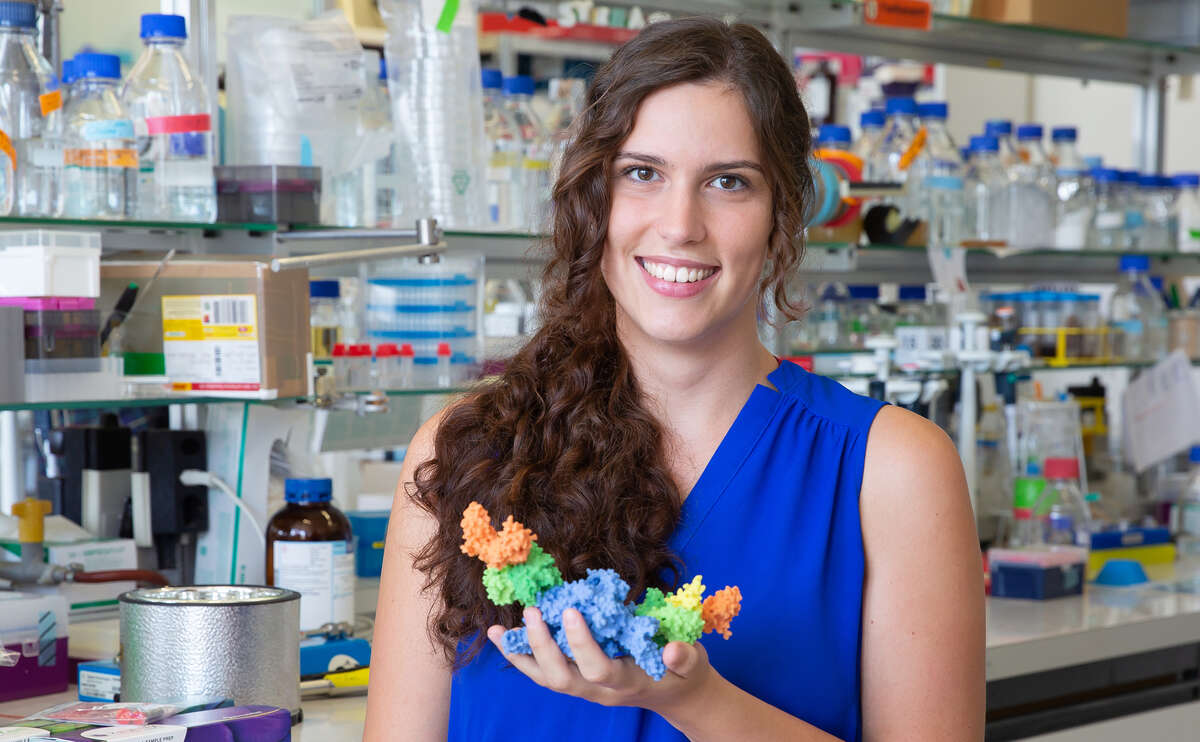Interview with Karolin Berneiser
Inspired by a colleague’s experience, Karolin Berneiser applied for the Biozentrum PhD Fellowships program. She is not only enthusiastic about the interdisciplinary and international research groups but also, in particular, the work with large molecular machines in the lab led by Prof. Timm Maier, where she is conducting her doctoral research.

Karolin, where did you do your masters and why did you choose to come to the Biozentrum for your doctorate?
I did my masters in Heidelberg, close to my hometown of Mannheim. During this time, I worked at Novartis in Basel, as an intern, for almost a year. That is when I fell in love with this city and Switzerland in general. During my last master’s year, which I carried out in Boston, I worked with a former PhD student from Timm Maier’s group. That was a lucky coincidence, as with my interest in molecular machines it made sense to have a closer look at the Maier lab. From my colleague, I received firsthand insights and the recommendation to apply for the Biozentrum Fellowships program. So, out of the various institutes that I had considered, I chose the Biozentrum.
Why are you doing a doctorate and what is so special about the Biozentrum PhD Fellowships program?
My desire is to one day investigate and discover something new and this with my own group – to achieve this goal, a PhD is a natural step in my career path. Something very special about the fellowships program is the rotation principle. Through the opportunity of experiencing various labs, you become acquainted with different approaches and methods. I am interested in the regulation of cell growth and metabolism on the molecular level, processes in which mTOR complexes play a key role. Before I started in my lab of choice, the Maier lab, I first did a rotation in the Hall lab. There I learned to investigate molecular processes in the cells. Through the cooperative atmosphere between the two labs, I am in the fortunate position to be able to study these molecular mechanisms from two different perspectives.
Furthermore, I find the Graduate Teaching Program, with its lecture series and courses, very interesting. Up to now I have mainly taken part in courses in the areas of interactions of biomolecules, structural biology and programming, because they helped me to dig deeper into my main subjects. To broaden my horizon, I am now considering other courses from the Lecture Cycles, for example epigenetics or translation.
What do you like most about the Biozentrum?
What is unique here is that so many different disciplines work so closely together. Not only spatially but also in terms of approach, as everyone has an interdisciplinary and cooperative mindset. Other universities usually have larger departments with teams that all work in similar areas, whereas here there are many different views about diverse topics. This, I particularly like about the Biozentrum. The synergies established with other academic institutes, such as the FMI and D-BSSE of the ETH Zurich, and collaborations with industry is another positive.
Who is your PhD thesis advisor, how do you collaborate and how did you choose your thesis topic?
My thesis advisor is Timm Maier. He supervises my work personally and advises and supports me in the various aspects of my work, so that I feel well taken care of and can also learn many things. It is important to him, that we always work with state-of-the-art techniques and technology, which means we pick up innovations and always have the appropriate equipment. This enables us to produce high quality work very efficiently.
Together with Timm Maier, I discussed and developed my PhD project based on my interest and current research questions. It focuses on mTOR complexes, which play a central role in the regulation of metabolism and are therefore of great importance in medical research.
In research, there are not only successes but also often frustrating moments. How do you deal with this?
Research is my passion and I pour my heart and soul into my work. Of course, this can lead to frustration when something doesn’t work out. On the other hand, this makes me get really excited when it does work, irrespective of whether it is a small or large success.
How is the workload and do you actually have time for hobbies?
The working hours are quite individual; I can allocate my time as it suits me. Of course, there are occasions when I also have to work on the weekend. This is however my own choice, so that I can save time in the coming week or to have exciting results sooner.
And I can still find time for my hobbies. I love hiking and, in Basel, you are not so far from the mountains. That is also one of the reasons why I chose to come here. I also have my university orchestra, where I play the bassoon, and my badminton group in Basel. So I have definitely found a good balance between work and hobbies.
Where do you see yourself in 10 years?
By then I will be 35 years old and hopefully already a junior group leader, in either academic research or in industry. I would like to keep my options open for now. This will also depend on the working environment. It is my dream to do research on a topic I feel passionate about, together with a team who shares my enthusiasm.


